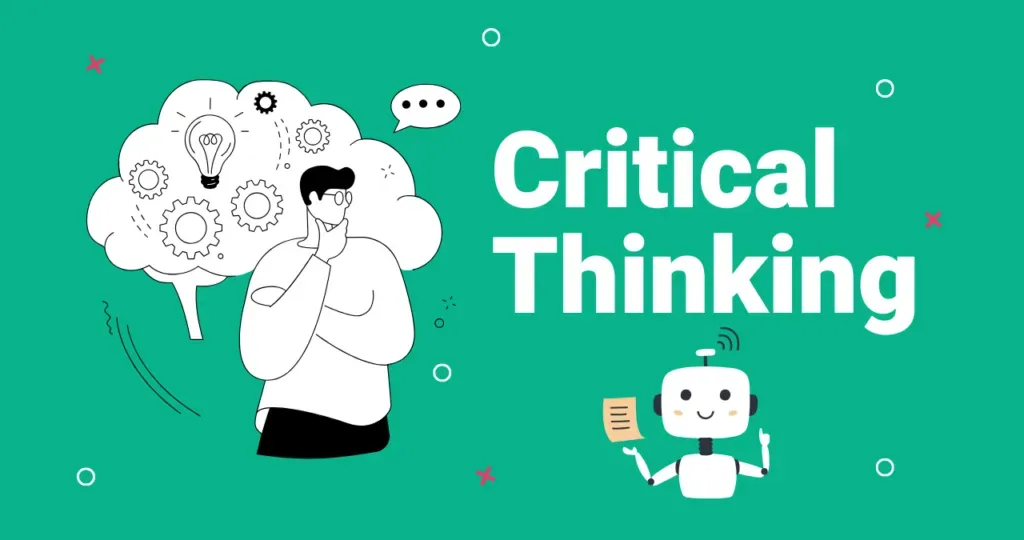In recent discussions about the impact of technology on education, the influence of ChatGPT on critical thinking has garnered significant attention. A study from MIT’s Media Lab revealed intriguing insights into how this advanced AI tool affects cognitive processes during tasks like essay writing. Participants using ChatGPT demonstrated a decrease in brain engagement, suggesting that this digital tool may inadvertently hinder critical analysis and creativity. The findings raise questions about the evolving relationship between AI and critical thinking, particularly as individuals increasingly rely on these digital assistants for academic tasks. As we explore the cognitive effects of AI and critical thinking, it becomes crucial to understand how tools like ChatGPT shape our learning experiences and decision-making processes.
The advent of advanced digital tools for learning has transformed the landscape of educational practices. With the rise of AI-powered applications, such as ChatGPT, an exploration of their effects on cognitive development and analytical skills has become essential. Research highlights that while these tools offer convenience, they may also contribute to a decline in participants’ engagement and effort in tasks like essay writing. As we navigate this new era of technology-enhanced education, understanding the implications of digital resources on learning outcomes and critical thought processes is vital. By evaluating tools like ChatGPT, we can gain insights into how they reshape our cognitive abilities and approaches to problem-solving.
The Role of Digital Tools in Enhancing Learning
Digital tools, like ChatGPT, have revolutionized the landscape of learning by providing immediate access to vast amounts of information and facilitating personalized education. The convenience of AI-driven platforms has allowed students to engage with material in new ways, enabling them to research more efficiently and explore diverse perspectives. Enhancements in technological resources stand to bolster educational outcomes, helping learners to grasp complex subjects and develop their understanding with tailored support.
However, while these tools can facilitate the learning process, they also necessitate a conscious effort to engage critically with the material. For example, relying solely on AI-generated content may lead to superficial engagement, where students fail to deeply analyze information. To maximize the benefits of digital tools in education, it is essential that students pair these resources with critical thinking exercises, ensuring they not only consume information but also question and interpret it thoughtfully.
Understanding ChatGPT’s Impact on Critical Thinking Skills
The study conducted by MIT’s Media Lab highlights the intriguing effects of ChatGPT on critical thinking abilities among students. Participants who utilized the AI tool showed diminished brain engagement, reflecting a trend toward cognitive reliance on technology rather than independent thought processes. Such findings raise important questions about how the habitual use of AI tools could hinder the development of critical thinking skills, potentially leading to a decline in the ability to analyze, evaluate, and create arguments independently.
As students become accustomed to pre-formed responses generated by ChatGPT, there is a risk of developing laziness in intellectual pursuits. This shift towards dependence on AI for essay writing can stifle creative thinking, resulting in a lack of original insights and a diminished capacity for critical discourse. Thus, it becomes crucial for educators to integrate discussions about AI’s cognitive effects into their curricula, encouraging students to maintain an active engagement with their learning processes rather than allowing technology to serve as a crutch.
Essay Writing with AI: A Double-Edged Sword
The integration of AI in essay writing offers both advantages and challenges for students and educators alike. On one hand, tools like ChatGPT provide quick and efficient ways to brainstorm ideas, structure essays, and refine language. This efficiency can be particularly beneficial for those facing time constraints or struggling with the writing process. However, this convenience may also foster a tendency to underperform, as evidenced by the study’s findings, where users relied heavily on copying and pasting rather than engaging in meaningful content creation.
Moreover, reliance on AI-generated content can lead to a decline in writing skills and lower levels of cognitive engagement. As students leverage these digital tools, they may miss out on the critical thinking processes that are integral to crafting compelling and original essays. To address this, educators must find a balance—encouraging the use of AI while also emphasizing the importance of developing writing skills and fostering a culture of critical thinking.
The Cognitive Effects of AI on Learning Engagement
In exploring the cognitive effects of AI tools such as ChatGPT, we must consider how these platforms shape learning engagement among users. The study illustrated that ChatGPT users exhibited lower levels of brain engagement, indicating a potential cognitive disengagement that can arise from habitual use of such digital tools. This phenomenon suggests that while technology can provide quick answers, it may also undermine the deeper levels of processing required for effective learning and absorption of knowledge.
As learners become accustomed to receiving information readily via AI, the challenge lies in preserving their cognitive vitality. Activating critical thinking skills becomes essential to combat the complacency that can arise with increased AI reliance. Educators are encouraged to promote interaction with AI in ways that stimulate cognitive effort, fostering environments where technology enhances rather than replaces the traditional, active learning experience.
Balancing Technology Use in Education
The question of how much technology should be integrated into educational practices is increasingly pressing. While tools like ChatGPT can enhance the learning experience by offering tailored assistance and instant information, there is a growing concern that over-reliance on such platforms could erode foundational skills. Schools and universities must thus navigate a balanced approach, utilizing digital resources judiciously while ensuring they complement traditional methods of learning.
In practice, this means encouraging students to use AI as a supplementary resource rather than a primary crutch. For instance, when using ChatGPT for essay writing, learners should first engage in brainstorming and outlining their ideas before consulting AI for refinement or examples. By promoting this balanced interaction, educators can help students develop robust critical thinking skills while still taking advantage of the efficiencies that AI provides.
Exploring the Future of AI in Education
As education continues to evolve with new technologies, the future of AI in the classroom presents both exciting opportunities and important challenges. ChatGPT and similar tools promise to reshape how information is delivered and consumed, enabling more dynamic and personalized learning experiences. However, such transformations come with the responsibility to ensure that these tools enhance rather than diminish critical thinking abilities among students.
In envisioning the future of AI in education, it is crucial to integrate discussions about cognitive effects into teacher training and curriculum design. By equipping educators with strategies to leverage AI tools effectively, we can create classroom environments that not only embrace technological advancements but also prioritize the development of essential critical thinking skills. This multifaceted approach will prepare students to thrive in an increasingly digital landscape.
The Importance of Critical Thinking in the Digital Age
In an age dominated by digital technologies, critical thinking has become more essential than ever. As students navigate vast oceans of information online, the ability to discern credible sources, analyze arguments, and generate thoughtful responses is vital. This skillset is particularly necessary in a world where AI tools, like ChatGPT, can produce misleading content or simplify complex issues, creating an illusion of understanding.
Moreover, promoting critical thinking in educational settings ensures that students are not passive recipients of information but active participants in their learning journeys. By fostering a culture that encourages questioning, debate, and reflection, educators can empower students to navigate the digital landscape confidently, preparing them for future challenges that require sound judgment and analytical skills.
Evaluating the Long-Term Effects of ChatGPT on Learning
The long-term effects of using ChatGPT and similar AI tools on student learning are still unfolding. As research indicates a trend toward reduced brain engagement among users, it is crucial to assess how this reliance may impact learning outcomes over extended periods. Continuous evaluation and monitoring of how students interact with AI tools will yield insights into shifting cognitive habits, allowing educators to refine their teaching approaches accordingly.
Moreover, understanding these effects requires a comprehensive approach that considers various educational contexts. How students utilize ChatGPT in different disciplines, for instance, could lead to varied impacts on their critical thinking and cognitive skills. By investigating these nuances, researchers and educators can better understand the overall implications of AI tools on learning, ensuring that technology enhances educational experiences without compromising cognitive development.
Encouraging Active Learning with AI Integration
To effectively harness the power of AI tools like ChatGPT, educators must encourage active learning strategies that promote engagement and critical thinking. Active learning involves students participating directly in the learning process rather than passively receiving information. This can include collaborative projects, problem-solving tasks, and critical discussions that leverage AI as a supplementary resource rather than a primary answer provider.
By creating opportunities for students to interact meaningfully with both the content and their peers, teachers can promote critical thinking and deeper understanding. For instance, incorporating group discussions where students critically assess AI-generated essays can foster analytical skills. This approach not only prepares students to use AI thoughtfully but also emphasizes the importance of human insight in learning—a key component of effective education in the digital age.
Frequently Asked Questions
How does ChatGPT impact critical thinking skills in users?
Research indicates that using ChatGPT may lead to a decline in critical thinking abilities, as users become reliant on the AI for generating content instead of engaging deeply with the material. This dependency can diminish the quality of thought and analysis in writing.
What are the cognitive effects of using ChatGPT for essay writing?
Studies suggest that individuals using ChatGPT show less brain engagement during essay writing, which correlates with a reduction in neural and linguistic activity. This decreased engagement may hinder the development of critical cognitive skills essential for effective writing.
Can AI tools like ChatGPT enhance or diminish digital literacy and critical thinking?
While AI tools like ChatGPT can assist in generating ideas, their use may diminish critical thinking and digital literacy skills if users rely too heavily on them. Engaging in traditional methods without digital assistance is crucial for developing comprehensive cognitive abilities.
What role do digital tools play in learning and critical thinking development?
Digital tools like ChatGPT can provide resources and facilitate learning but may inadvertently reduce critical thinking engagement if misused. It’s vital to balance the use of such tools with traditional learning practices to foster a more robust critical thinking framework.
How does ChatGPT affect essay writing habits among students?
The study found that students using ChatGPT often resorted to practices like copying and pasting, demonstrating a lack of effort in their writing. This trend points to a potential decline in the development of original thought and effective writing habits.
What does EEG monitoring reveal about brain engagement while using ChatGPT?
EEG monitoring in the study revealed that participants using ChatGPT displayed the least brain engagement compared to those employing traditional writing methods. This highlights concerns regarding how AI tools may inadvertently reduce cognitive effort during critical thinking tasks.
Are there long-term concerns about ChatGPT’s impact on cognitive skills?
Yes, there are significant concerns regarding the long-term implications of using AI tools like ChatGPT. As users become more dependent, there’s a risk of deteriorating critical thinking skills and overall cognitive engagement, which are essential for effective communication and analysis.
Can students balance the use of ChatGPT and traditional writing methods to enhance critical thinking?
Absolutely. Students can benefit from using ChatGPT as a supplementary tool while ensuring they engage in traditional writing practices that promote deeper critical thinking and cognitive processing.
What are potential strategies to mitigate the negative effects of ChatGPT on critical thinking?
To mitigate the negative effects, users should limit their reliance on ChatGPT, practice reflective writing, engage in peer discussions, and prioritize developing original content through traditional research methods.
Is there a difference in cognitive engagement between using ChatGPT and other search engines?
Yes, the study indicates that participants using ChatGPT had lower cognitive engagement compared to those using traditional search engines, suggesting that the interactive nature of AI may lead to less analytical thinking.
| Key Points |
|---|
| The study conducted by MIT’s Media Lab explored the impact of ChatGPT on critical thinking abilities. |
| 54 participants were divided into three groups: using ChatGPT, Google search, and traditional writing methods. |
| EEG technology was utilized to monitor brain engagement during the essay writing process. |
| Findings showed that those using ChatGPT had the least brain engagement compared to other groups. |
| Participants using ChatGPT displayed a decline in performance across neural, linguistic, and behavioral measures. |
| Over time, users became reliant on ChatGPT, leading to laziness in writing habits. |
| The study raises questions about the long-term effects of AI on cognitive skills and critical thinking. |
Summary
ChatGPT’s impact on critical thinking is noteworthy, as recent research highlights both the benefits and drawbacks of its use. While AI tools like ChatGPT offer unique support for users, particularly in accessibility, they may inadvertently stunt the growth of essential cognitive skills such as critical thinking. The evidence suggests that reliance on ChatGPT can lead to decreased brain engagement and an inclination toward laziness in writing practices. As we continue to integrate technology into our daily tasks, it becomes increasingly important to understand and mitigate these potential downsides to preserve and enhance our critical thinking abilities.



